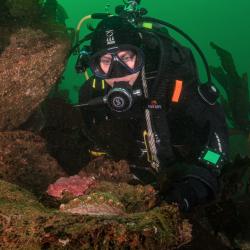Melissa Neuman, Ph. D.
Background
Melissa Neuman earned a Ph.D. in ecology and evolution from Rutgers University in 1999, an M.S. in fisheries, animal and veterinary science from the University of Rhode Island in 1993, and a B.A. in biology from the University of Pennsylvania in 1990. She served as adjunct faculty at Rider University, the University of Delaware, and Stockton State College where she taught marine vertebrate zoology, ichthyology, and associated laboratories. As a post-graduate she served as assistant director of the Rutgers University Marine Field Station and post-doctoral research associate at the Northeast Fisheries Science Center. In 2002, Melissa was hired to lead NOAA Fisheries’ recovery program for the first marine invertebrate to be listed under the U.S. Endangered Species Act (ESA).
Current Focus
Today, Melissa’s work is focused on conducting status reviews for at risk marine species, making decisions about whether to list species as endangered or threatened under the ESA, developing recovery plans for species that receive ESA protection, and advising undergraduate interns and graduate students. One of her primary responsibilities is to implement NOAA’s strategy for conserving and restoring endangered white abalone, an iconic member of kelp forest communities in the U.S. and Mexico, through captive propagation and enhancement activities. In this capacity, she works closely with and helps to provide funding for a consortium of partners who are developing methods for the successful introduction of captive-bred white abalone to the wild. Under her leadership over 8,000 white abalone have been placed into wild reef habitats since 2019. She is a NOAA certified scientific diver who enjoys staying connected with the resources she helps to manage. This helps her communicate the importance of protecting our marine resources to bolster the cultural, economic and biological resilience of coastal communities.
